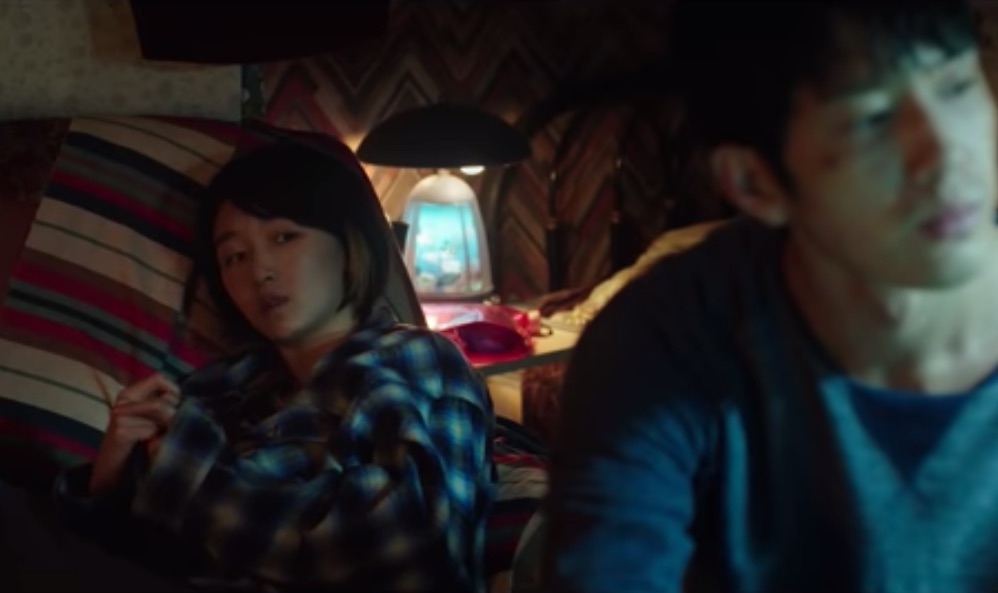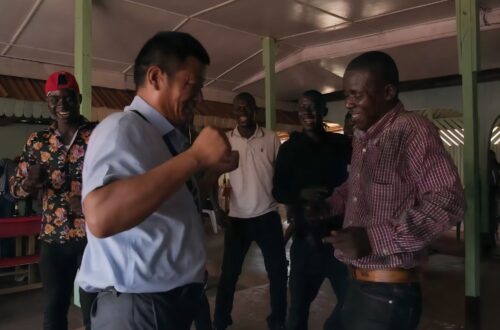‘Us and Them’: The searing beauty of big dreams and big regrets

Now on Netflix: A story about love, struggle, big dreams in Beijing, regret, and the things which ultimately most matter.

Us and Them, the directorial debut of singer and actress Rene Liu (刘若英 Liú Ruòyīng), tells a classic love story of have-nots trying to have it all. The narrative spans a decade as it explores two young, poor dreamers who try to make a life in the progressing mecca of Beijing. Xiaoxiao (played by the petite but powerful Zhōu Dōngyǔ 周冬雨) is an eccentric dreamer who can drink and play cards with the boys and is set on having a man secure her a home and give her a cosmopolitan life in Beijing. Jianqing (played by Jǐng Bórán 井柏然) is an aspiring video game designer who fluctuates between boyish listlessness and brutal ambition as he uses his life experiences to create his debut game. He has a close relationship with his father, who owns a small neighborhood restaurant in his hometown. As with many Chinese movies, food and meals become visual highlights for the film.
Xiaoxiao and Jianqing first meet on a crowded train home for the Lunar New Year, and continue a relationship that oscillates between childlike friendship and intense romance. As their financial and social burdens grow, the lovers retreat into themselves and suffer a painful and life-altering break-up.They later reconnect on a flight home for New Year’s 10 years later, when both have presumably “made it,” and fall back into the comfort of each other’s familiar humor and affection. Their recollections become the foundation on which we learn about the couple’s torrid and passionate past of sharing Ramen noodle dinners, drinking cheap beer, working poorly paid jobs in shopping malls, and looking toward their dreams in a windowless bedroom.
The film is deftly shot by acclaimed director of photography Mark Lee Ping-bing (李屏宾 Lǐ Píngbīn), who creates a visual language that is both sumptuous and concise. The cinematography is wonderfully choreographed and lively, with long glossy takes that show the intricacies of squalid living quarters and luxury high-rise apartments without distracting the audience from the small details that make each scene feel lived in. The costume and set design is superb, naturalistic though never exploiting the dirt or mess of cliché poverty, with light touches, a colorful blanket or wacky platform shoes, that are just the right amount of eccentric without delving into kitsch or quirk. One can almost smell the salty powder of Ramen noodles, the tinge of old cigarette smoke in the bedroom, and this sensorial exploration keeps the audience engaged even through tedious fights and repetitive dialogue. You wish that the couple could be more risky, more audacious, and not let themselves fall into the monotony of trying to make money day after day. What are their other boundaries and obstacles? After a while, an audience can only care about RMB for so long.
Zhou and Jing are exceptional as intimate lovers and lifelong friends. Their bond is always palpable and challenging toward each other and the viewer; each glance they share conveys the depth with which they care for each other. And the viewer understands that this care comes with intense frustration, anxiety, and profound love. The two, when together, exist in their own private sanctuary. It’s beautiful to watch, but cannot always remedy the narrative clunkiness or tedious pace of the film. At two hours, the film can sometimes feel longer. Scenes start to seemingly repeat themselves, and instead of showing new facets of what the New Year will bring the couple, the timeline of the film highlights the monotony of each passing year, where everything is basically the same. Jianqing takes an unexpected turn and for a while becomes unbearable, but his character arc feels unjustified and rushed, only to exploit and tamper with the emotional bond the viewer has formed with the character. If executed with more precision, Jianqing’s journey could’ve told an eloquent and much-needed story about toxic masculinity and the pressure of filial piety in contemporary China. As of now, he just seems like a douche, only forgivable due to Jing’s nuanced and steady portrayal.
It’s easy to be weary of a film that boasts five screenwriters. Often, the best love stories are written by one, maybe two, to create voices that are extremely specific and a bond that feels steady even during the most tumultuous times. If Liu had experienced less intervention in the writer’s room, I wonder where this story could’ve gone, if it could have sprawled out to be messier, more ecstatic, and more adventurous than the very traditional story the viewer receives.
Still, Us and Them is an exciting and well-executed debut from Liu as well as a satisfying love story overall. The film also translates surprisingly well to a global audience, given the amount of cultural specificities it highlights. The themes of being young, in love, with big dreams and thin wallets, has become a universal narrative, especially during a time of rampant capitalism, and can only add to a growing canon about how money and dreams of material wealth can fracture the bonds of even the most destined soulmates.
Us and Them is currently available to stream on Netflix.
Film Friday is The China Project’s film recommendation column. Have a recommendation? Get in touch: editors@thechinaproject.com





